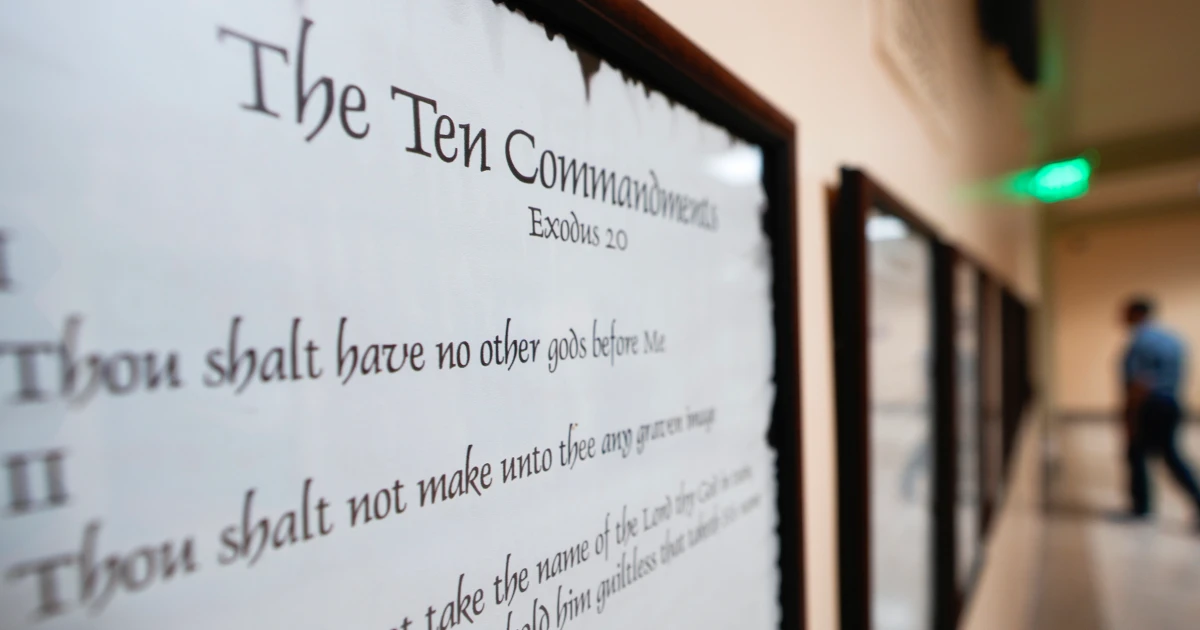
Louisiana’s Ten Commandments law in public schools blocked by federal appeals court
How did your country report this? Share your view in the comments.
Diverging Reports Breakdown
Louisiana’s Ten Commandments law in public schools blocked by federal appeals court
A federal appeals court rules unanimously in favor of a coalition of Louisiana parents. They sued to block a state law that requires public schools and colleges to display the Ten Commandments in classrooms. The case moves closer to potentially going before the U.S. Supreme Court, which has a 6-3 conservative majority. It’s unclear how many, if any, school districts have begun to comply, and questions remain about what might happen to educators who ultimately don’t cooperate. The law dictates the posters must be at least 11 by 14 inches and include a “context statement” that provides historical context for the commandments, which the state believes makes its law constitutional. But a lawyer for the plaintiffs said the purpose of the law is tied to religion and violates a separation of church and state, which he says can’t be avoided in this case.. In April, the Supreme Court heard a bid by Oklahoma to approve the first publicly funded religious school charter in that state. That law would allow the Bible to be posted in all public schools.
The appellate court’s decision upholds a lower court’s ruling in November declaring Louisiana’s law “facially unconstitutional.”
“Parents and students challenge a statute requiring public schools to permanently display the Ten Commandments in every classroom in Louisiana. The district court found the statute facially unconstitutional and preliminarily enjoined its enforcement. We affirm,” the court said in its ruling.
Now, the case moves closer to potentially going before the U.S. Supreme Court, which has a 6-3 conservative majority.
“We are grateful for this decision, which honors the religious diversity and religious-freedom rights of public school families across Louisiana,” said the Rev. Darcy Roake, who is a plaintiff in the case.
Louisiana’s Attorney General Liz Murrill will continue to pursue the case through the courts.
“We strongly disagree with the Fifth Circuit’s affirmance of an injunction preventing five Louisiana parishes from implementing HB71. We will immediately seek relief from the full Fifth Circuit and, if necessary, the United States Supreme Court,” Murrill said in a statement.
Louisiana’s law went into effect this year at public K-12 schools and state-funded universities. State officials issued guidance on how posters of the Ten Commandments could be designed and hung up in classrooms for educational purposes.
While the law applies to the majority of school districts throughout the state, the five school districts that have parents who are plaintiffs in the original lawsuit are exempt while the litigation plays out.
It’s unclear how many, if any, school districts have begun to comply, and questions remain about what might happen to educators who ultimately don’t cooperate.
During the federal appeals court hearing in January, Louisiana Solicitor General Benjamin Aguiñaga argued that the plaintiffs’ lawsuit was filed too early — before any posters have been displayed.
“The plaintiffs seek to challenge hypothetical displays that do not exist and that they have never seen,” Aguiñaga said.
“The plaintiffs jumped the gun here and filed an unripe case,” he said.
But Jonathan Youngwood, a lawyer for the coalition of parents representing Jewish, Christian, Unitarian Universalist and nonreligious backgrounds said the purpose of the law is tied to religion and violates a separation of church and state.
“What makes this so significant is the requirement that it be in every single (classroom) throughout your 13 years in public school, 177 days a year,” Youngwood said. “It can’t be avoided. It can’t be averted.”
The American Civil Liberties Union, the American Civil Liberties Union of Louisiana, Americans United for Separation of Church and State, the Freedom from Religion Foundation, and Simpson Thacher & Bartlett LLP are supporting the plaintiffs.
Louisiana Attorney General Liz Murrill has said no public funds would be required to be spent on printing the posters and they can be supplied through private donations. The law dictates the posters must be at least 11 by 14 inches and include a “context statement” that provides historical context for the commandments, which the state believes makes its law constitutional.
In a Facebook post in January, Murrill said the state contends that federal courts “have no jurisdiction to decide this case.”
“The Constitution does not bar our Legislature’s attempt to teach our students what the Supreme Court has repeatedly said: The Ten Commandments have historical significance as a foundation of our legal system,” Murrill said.
But U.S. District Judge John deGravelles of the Middle District of Louisiana disagreed with the state in his ruling in November, in which he wrote that there is no “constitutional way to display the Ten Commandments in accordance with the minimum requirements of the Act.”
The Supreme Court has also taken up the issue previously, when the justices ruled 5-4 in 1980 that Kentucky’s posting of the Ten Commandments in public schools was unconstitutional.
Still, President Donald Trump endorsed Louisiana’s law during his campaign.
Louisiana and other Republican-led states have pushed for new bills and policies that are testing the bounds of religion in public schools. That has included Oklahoma ordering public schools grades five through 12 to incorporate the Bible into lesson plans and Texas allowing public school districts to opt in to a new elementary school curriculum featuring Bible-based lessons.
In April, the Supreme Court heard a bid by Oklahoma officials to approve the nation’s first publicly funded religious charter school.
Meanwhile, Republican leaders in other states have supported legislation similar to Louisiana’s that would allow for the Ten Commandments in public schools. In April, Arkansas legislation requiring the Ten Commandments to be posted in all public schools’ classrooms and libraries became law just days after the GOP-controlled Legislature passed it. Texas passed its own bill in May, and Gov. Greg Abbott, a Republican, is expected to sign it.
